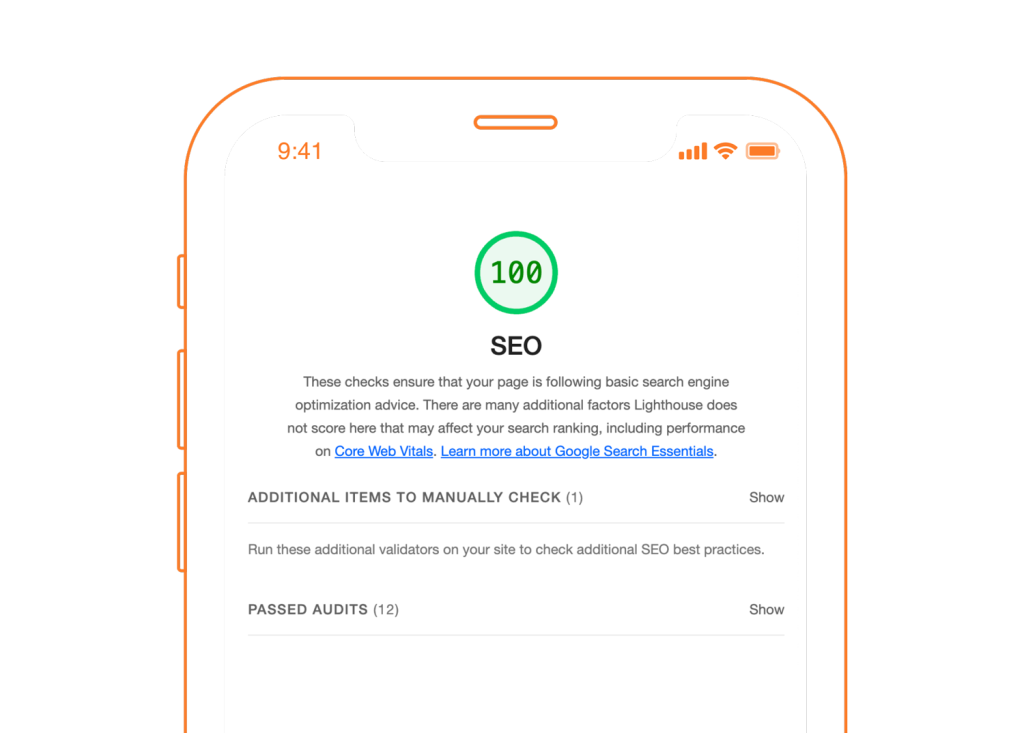SEO foundations
SEO is the cornerstone of long-term organic (free) Google traffic. Every website we build is made to meet and exceed SEO best practices. Where required, we engage with our specialist partners: experts who devour Google algorithm updates and are always testing.

Summary: the quick version of this page
We build websites from the get-go with SEO in mind, giving you an ideal foundation for long-term organic (free) Google traffic. We excel at on-page SEO which means creating your website and its pages to meet and exceed best practices to be analysed and listed by Google. For larger clients in markets with aggressive search engine competition, we liaise with our trusted specialist SEO partners on an ongoing basis.
The ABCs of SEO
Before you delve any further into our SEO offerings, familiarise yourself with the basic terms of SEO. It’s an industry field that’s littered with acronyms and technical terms, so we’ll focus only on the most important ones.
What SEO is
Put simply, SEO is the art of ensuring your website shows up in search engines when people search for content that relates to your website. These days, when we refer to “search engines” we really just mean Google, with its dominant 90%+ share of the search engine market. Of course, any investment in SEO is also beneficial for being found via other search engines including Bing and DuckDuckGo.
A brief history of search engines and SEO

Search engines first arose when the internet became so large it was no longer realistic for people to find everything they needed by typing in URLs directly. It’s a bit like a phonebook – everyone can probably memorise 5–10 phone numbers that they use often, but for contacting anyone else the phonebook was the way to go.
For websites, this “online phonebook” was known as AltaVista, AOL or Yahoo!, and instead of phone numbers, it listed websites. These days, Google is the clear market leader in search engines.
Cheating the system
When search engines first arrived, some website builders and owners would try to cheat the system through the use of techniques such as “keyword stuffing”. Back then, search engines would trust everything that they read – if a website had 10,000 keywords hidden in the website’s code (invisible to the user but readable by the computers that analyse the website), the search engine would assume that the content on the website actually related to those keywords, and would show the website in any search results that included those words. As an example, a website for a plumber could include thousands of hidden keywords for whatever was popular at the time (and being searched for en masse), such as Beanie Babies or Tamagotchis.
The advent of algorithms

As the internet grew exponentially larger and websites grew in number from thousands, to millions, through to the 1 billion+1 of today, search engines needed to come up with a way to ensure users actually found the content they were searching for. If they couldn’t, why would users come back for more?
As search engines became more sophisticated, they developed systems to identify and penalise SEO cheating methods such as the keyword stuffing we mentioned earlier. Search engines now prioritise delivering high quality, relevant content to users, using advanced algorithms that factor in thousands (if not millions) of factors when deciding which websites and web pages to show on a results page.
This was the beginning of SEO as a concept: how do you optimise a website (and its web pages) in a way that makes sure your website is delivered to the right people when they search for a product or service you offer?
What SEO is not
Many people confuse SEO with AdWords (now just “Google Ads”), Google’s paid service that shows paid website results above organic search results. That’s a different kettle of fish – see our online advertising services for more on that.
SEO is not a quick-fix solution for immediate visibility or overnight success, nor does it generate instant results (see our page on online advertising if it’s instant results you’re after). SEO is a long-term strategy that requires patience, consistency, and a holistic approach to SEO.
SEO is also not a substitute for poor website quality; it cannot compensate for a slow or poorly designed website, irrelevant content, or a bad user experience (that’s a bit like having ads in the newspaper for a store that’s only open for an hour every day).
Why does SEO matter?

It won’t come as any surprise to learn that for most websites, the vast majority of website visitors arrive via Google search. Unless someone knows your URL and types it directly or clicks through from other sources, chances are they’ll be Googling for either your company’s name, or a product or service that you offer, eventually leading them to your website.
But with the internet being so large, there’s only so much that Google can learn about a website if it’s not optimised for search engines. SEO is the process of designing and building websites to an accepted (and evolving) set of best practices that give Google the best chance of crawling (analysing) and then indexing (listing) your website in a manner that ensures people can find it via realistic and obvious search terms.
Our approach to SEO
SEO in practice can be thought of as two (not necessarily equal) halves – on-page SEO and off-page SEO, with the on-page side of things being where we at Mix Digital place the most emphasis.
On-page vs. off-page SEO
On-page SEO is all about your website itself – how it’s built, how fast it loads, and the content of your website pages. On-page optimisation is arguably the most important tranche of SEO, and it’s the part at which we excel. This includes optimising meta tags for things such as the description that shows up on Google when people search for your website.
Off-page SEO on the other hand refers to everything else, the most important of which, in our professional opinion, is backlinks (other websites linking to yours). Backlinks are a form of automated quality control that Google employs, whereby they work on the assumption that if a high-quality, well-trafficked website is willing to link through to your website, then your website must be quality too. It’s kind of like word of mouth for robots.
At Mix Digital we prioritise on-page SEO excellence in every website we build. By optimising each page, we establish a strong foundation for long-term success in Google’s search results.
Page speed is a major factor in Google’s page rankings. We build with speed in mind as it’s also hugely beneficial for the user experience. During the build and launch phase of websites that we create, we use industry standard benchmarking and speed analysis tools to ensure that whatever we are creating will be fast to load for both users and search engines.
SEO promises: buyer beware

If you’ve ever owned or managed a website you would probably have received unsolicited emails from SEO companies making big promises – such as they’ll “guarantee you’ll be on the first page of Google”. What they don’t tell you is that sure, you’ll be on the first page of a Google search, but it will be for an obscure keyword or phrase that your target customer isn’t likely to search for.
The trick here is that these companies use (legitimate) SEO tools to find keywords that have low competition – that is, not many competing websites in your industry and market use those keywords on their own websites – making it easy for you to appear on the first page.
Another trick to “get you on the first page” is that they’ll use Google Ads (formerly AdWords) – meaning that while you are indeed on the first page of Google search results, you’re paying Google every time you appear there. Google Ads are fantastic, and something we can take care of for you, but we’d never sell this service as “getting you on the first page”!
Our trusted partners
For some of our larger clients in industries with aggressive search engine competition, we work alongside specialist SEO partners who we know and trust – experts who can advise on ongoing updates and proactively build backlinks to your website to keep you in the ranking game.
We don’t play middleman or clip the ticket, rather we help you to establish a direct relationship with these partners. Our ongoing role becomes one of liaising with these SEO specialists to make updates if and when required to enhance your website’s on-page SEO.
Our SEO services include:
- On-page SEO to meet or exceed industry best practice, on every website we build
- Setup and integration with Google Search Console to monitor page indexing status
- Setup and integration with Google Analytics to monitor search traffic
- Setup and integration with Google Tag Manager to monitor SEO across multiple platforms (eg. social media pages)
- Setup and integration of premium WordPress SEO plugins for streamlined on-page SEO updates
- SEO audits and analysis of existing websites
Our SEO foundations complement these other services:
Price calculator: Get an instant price indication for your project
References
